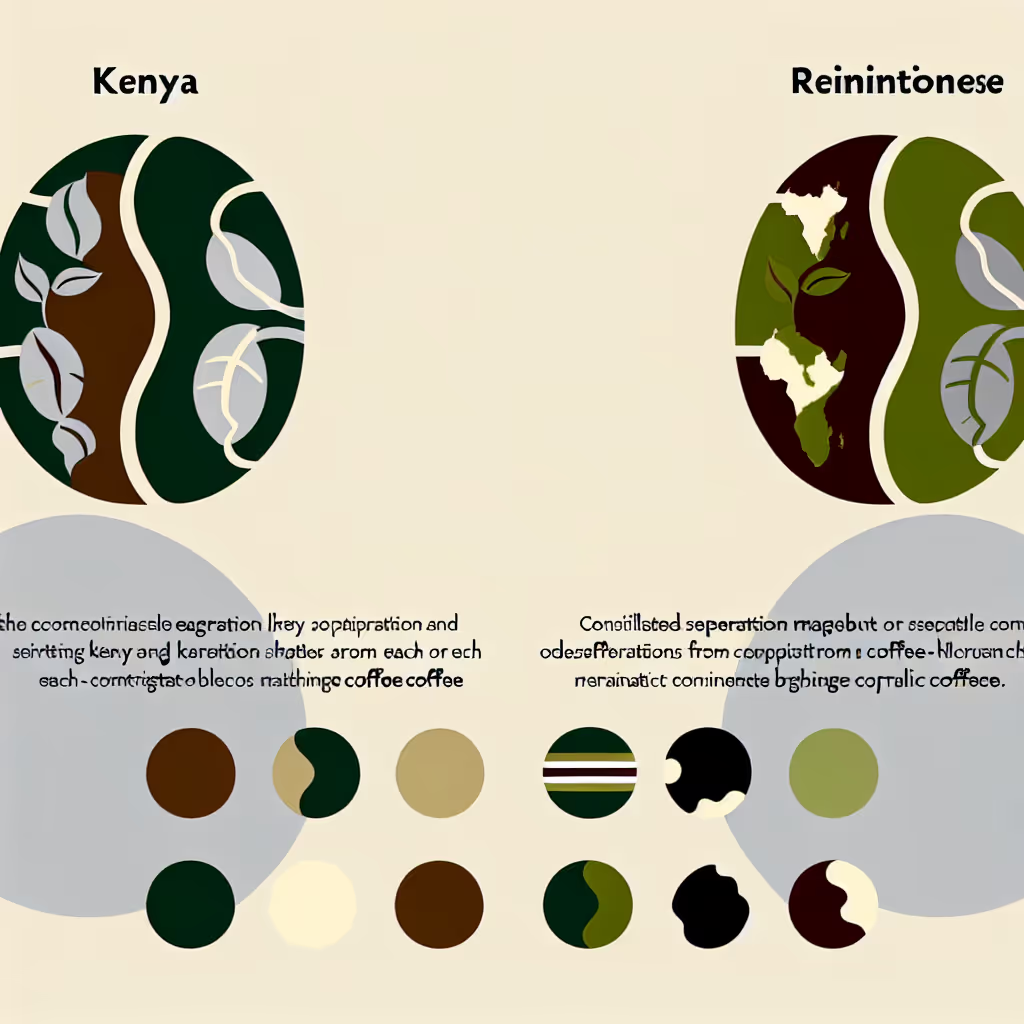Kenyan Vs. Equatorial Guinean Coffee
This comparison explores the distinct qualities of Kenyan and Equatorial Guinean coffee, highlighting their unique flavor profiles, growing conditions, and cultural significance in the world of specialty coffee.

Brief Description
Kenyan coffee is renowned for its bright acidity, full body, and complex flavor profile. Grown in the rich volcanic soils of the Central Highlands, these beans benefit from ideal climate conditions and meticulous processing. The result is a cup that's bold, wine-like, and often described as the 'connoisseur's choice'. With notes ranging from blackcurrant to citrus, Kenyan coffee offers a truly unique and memorable tasting experience.
Equatorial Guinean coffee, grown primarily on Bioko Island, is a hidden gem in the world of African coffees. The volcanic soil and tropical climate create ideal conditions for cultivating unique and flavorful beans. While not as well-known as its neighboring countries' coffees, Equatorial Guinean coffee is gaining recognition for its distinct taste profile and potential for high-quality production. The industry is small but growing, with efforts to improve cultivation practices and promote sustainable farming methods.
Importance of Comparison
Comparing Kenyan and Equatorial Guinean coffee is crucial for coffee enthusiasts seeking to expand their palate and understand the diverse flavors of African coffees. This comparison helps buyers make informed decisions based on taste preferences, brewing methods, and origin characteristics, while also shedding light on lesser-known coffee-producing regions like Equatorial Guinea.
Key Attributes
Origin
Kenyan
Equatorial Guinean


Consumer Guide
When choosing between Kenyan and Equatorial Guinean coffee, consider your flavor preferences. Kenyan coffee offers a bright, complex profile with notes of blackcurrant and citrus, ideal for those who enjoy a bold, wine-like taste. Equatorial Guinean coffee presents a more earthy, nutty flavor with chocolate undertones, perfect for those who prefer a smoother cup. For brewing, Kenyan coffee excels in pour-over and French press methods, while Equatorial Guinean coffee shines in espresso and cold brew. Consider the altitude difference: Kenyan beans grow at higher elevations (1400-2100m), contributing to their complexity, while Equatorial Guinean beans (500-1200m) offer a unique lowland flavor. Lastly, think about availability and sustainability: Kenyan coffee is more widely available, while Equatorial Guinean coffee offers a chance to support a growing, sustainable industry.
Expert Opinions
Coffee expert Maria Rodriguez notes, 'Kenyan coffee is often considered the pinnacle of African coffees, with its vibrant acidity and complex flavor profile. However, Equatorial Guinean coffee is an exciting newcomer, offering a unique taste of West African terroir.' Roaster John Smith adds, 'While Kenyan coffee is perfect for those seeking a bright, bold cup, Equatorial Guinean beans offer a more subtle, nuanced experience that's gaining popularity among specialty coffee enthusiasts.'
FAQs
Kenyan coffee is known for its bright acidity and complex flavor profile, featuring notes of blackcurrant, citrus, and floral undertones. In contrast, Equatorial Guinean coffee offers a more earthy and nutty flavor with chocolate notes, resulting in a smoother, less acidic cup.
Kenyan coffee excels in pour-over, French press, and cold brew methods, which highlight its complex flavors and bright acidity. Equatorial Guinean coffee is well-suited for French press, espresso, and cold brew, which bring out its earthy and nutty characteristics.
Kenyan coffee is typically grown at higher altitudes (1400-2100m), contributing to its complex flavor profile and bright acidity. Equatorial Guinean coffee, grown at lower elevations (500-1200m), develops a unique lowland flavor with earthy and nutty notes.
Kenyan coffee is primarily processed using washed methods, including double fermentation and sun-drying, which enhance its clean, bright flavors. Equatorial Guinean coffee employs a variety of methods, including natural, washed, and semi-washed processing, contributing to its diverse flavor profile.
Kenya produces significantly more coffee, with an annual output of around 50,000 metric tons. Equatorial Guinea's coffee industry is much smaller, producing approximately 500 metric tons annually. This difference in scale affects availability and market presence of these coffees.
Both origins have sustainability initiatives, but Equatorial Guinea's smaller, growing industry offers a unique opportunity to support emerging sustainable practices. Kenya's established industry has well-developed sustainability programs, while Equatorial Guinea is focusing on improving cultivation practices and promoting sustainable farming methods in its developing coffee sector.
Conclusion
Kenyan and Equatorial Guinean coffees offer distinct experiences for coffee lovers. Kenyan coffee, with its bright acidity, complex flavor profile, and widespread availability, is perfect for those seeking a bold, vibrant cup. Equatorial Guinean coffee, while less common, provides a unique opportunity to explore a developing coffee origin with its earthy, nutty, and chocolate notes. Both origins showcase the diversity of African coffees and offer exciting options for different palates and brewing preferences. Whether you choose the established excellence of Kenyan beans or the emerging potential of Equatorial Guinean coffee, both origins promise a rich and rewarding coffee experience.






